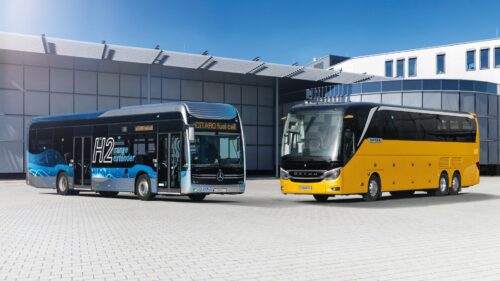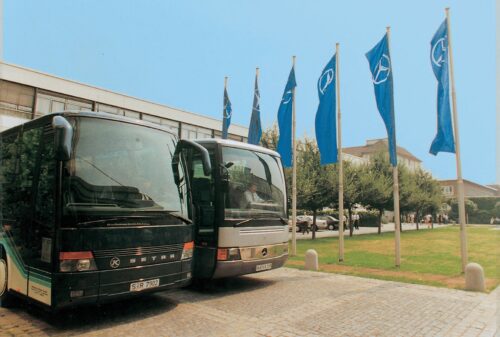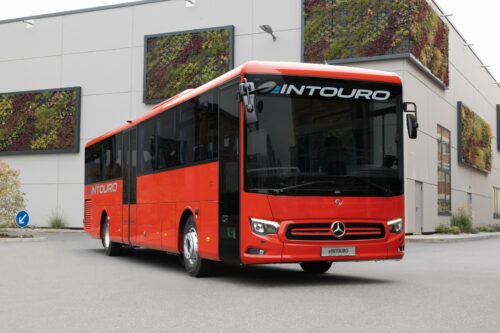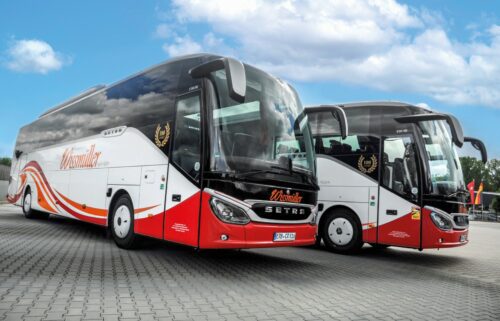
GERMANY: Daimler Buses is celebrating its 30th anniversary, having been formed by the bringing together of Mercedes-Benz and Setra brands. On 23 February 1995, EvoBus was established by a merger of the former Daimler Benz bus division and the Karl Kässbohrer Fahrzeugwerke bus division, based in Ulm, since when the Mercedes-Benz and Setra brands have been operating under one roof. In 2023, the company was renamed Daimler Buses, and is now a wholly owned subsidiary of Daimler Truck.
CEO of Daimler Buses Till Oberwörder said: “In 1995, we laid the foundation for a true success story and brought together the best of both worlds. Today, we are the market leader in our most important key markets and with production locations in Mannheim and Neu-Ulm, we are the only manufacturer of buses over eight tons producing vehicles in Germany. This is something we can be proud of. I am convinced that we are well positioned for the future and that we will continue to drive forward the transformation of locally CO˜-neutral passenger transport with our vehicles.”
Last year, Daimler Buses sold around 26,600 vehicles worldwide, and had a headcount of more than 15,000 employees. Bruno Buschbacher, Chairman of the General Works Council at Daimler Buses, commented: “Since the merger, the works councils at the Mannheim and Neu-Ulm sites have worked with employees to overcome many challenges, enabling Mercedes-Benz city buses and Setra coaches and inter-city buses to assert themselves in a highly competitive market. The target picture for 2033, which we agreed with the enterprise two years ago, has made bus production in Germany competitive in the long term. This will help to ensure good and attractive jobs at both locations.”

The merger proved to be a challenge for those involved, says Daimler, as both Mercedes-Benz and Setra were market leaders, and political and anti-competition hurdles first had to be overcome. Establishing an efficient production network between the traditional Daimler-Benz site in Mannheim and the Kässbohrer plants in Neu-Ulm, Holýšov in the Czech Republic and Ligny-en-Barrois in France was one of the strategic objectives when the enterprise was founded, and in the years since, Daimler Buses has expanded its production network to include additional sites in Samano in Spain, and Ho°dere, Turkey. The two German sites in Mannheim and Neu-Ulm continue to play key roles, however: The Mannheim plant is the company’s competence centre for electrically powered city buses, whilst Neu-Ulm is the centre for coaches of all drive types, and the only site that manufactures Setra coaches. Daimler Buses says it plans to invest around €150 million in the two German sites by the end of the decade.
Decarbonisation roadmap
The manufacturer says it has a clear e-roadmap for the electrification of its vehicles across all segments, and in line with the dual strategy of parent company Daimler Truck, Daimler Buses is relying on both battery-electric and hydrogen-based technologies. The battery-electric Mercedes-Benz eCitaro has been in series production since 2018, and has also been available with a hydrogen-based fuel cell as a range extender since 2023.

A battery-electric Mercedes-Benz eIntouro inter-city bus is scheduled to follow from 2026. In addition, Daimler Buses plans to have electrically powered coaches in its portfolio by the end of the decade, allowing it to offer battery or hydrogen-based CO˜-neutral models for applications in all market segments by 2030. The company says its focus will initially be on the core markets of Europe and Latin America, and by 2039 expects that only CO˜-neutral new vehicles will be sold for local applications in the core market of Europe, or from as early as 2030 in the city bus segment.
The company has also expanded to support its customers during the transition to electric power, launching a new subsidiary, Daimler Buses Solutions GmbH, in June 2023 which specialises in the design and development of electric and hydrogen infrastructure. Alongside those activities, Daimler Buses is also responsible for service brands Omniplus and BusStore, and operates in Brazil, Mexico, North America and Turkey.
Neu-Ulm and Mannheim
The Neu-Ulm site is the centre of excellence for coaches. The plant employs around 3,600 people in central functions as well as in bus production. Final assembly of Mercedes-Benz and Setra coaches takes place at the Neu-Ulm plant, and inter-city and coach seats for both brands are also produced in-house.

At the same time, the Neu-Ulm site also accommodates the paintwork competence centre for the company’s whole production network, the central parts supply division for Mercedes-Benz and Setra buses, the Daimler Buses development centre for safety and assistance systems, and the testing department.
The Mannheim plant is the company’s centre of excellence for city buses of all drive types. It was established in 1908 in the Luzenberg district of Mannheim-Waldhof and today provides employment for around 3,200 people in key roles as well as in assembly. In addition to conventionally powered city buses, the all-electric eCitaro also rolls off the production line at the site.

